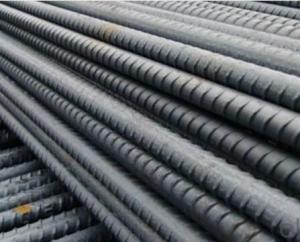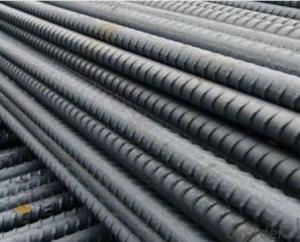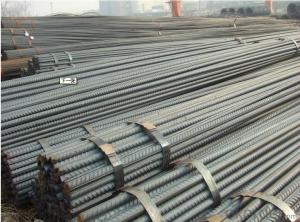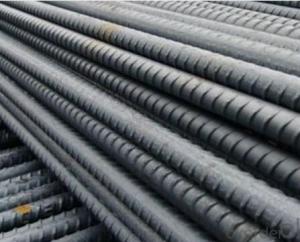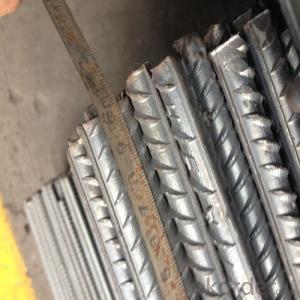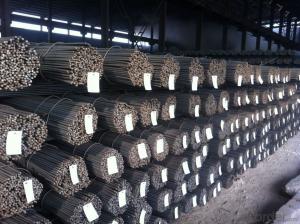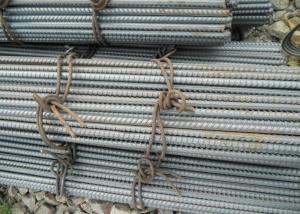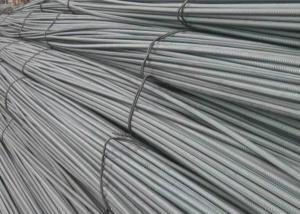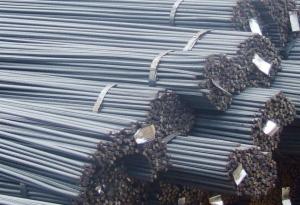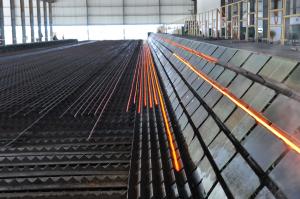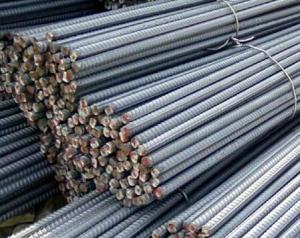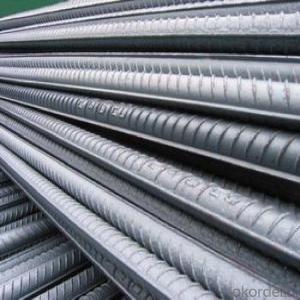Stainless Hot Rolled Steel Rebar with Standard GB,UK,USA
- Loading Port:
- China Main Port
- Payment Terms:
- TT or LC
- Min Order Qty:
- -
- Supply Capability:
- -
OKorder Service Pledge
OKorder Financial Service
You Might Also Like
Product Description:
OKorder is offering Stainless Hot Rolled Steel Rebar with Standard GB,UK,USA at great prices with worldwide shipping. Our supplier is a world-class manufacturer of steel, with our products utilized the world over. OKorder annually supplies products to European, North American and Asian markets. We provide quotations within 24 hours of receiving an inquiry and guarantee competitive prices.
Product Applications:
Stainless Hot Rolled Steel Rebar with Standard GB,UK,USA are ideal for structural applications and are widely used in the construction of buildings and bridges, and the manufacturing, petrochemical, and transportation industries.
Product Advantages:
OKorder's Stainless Hot Rolled Steel Rebar with Standard GB,UK,USA are durable, strong, and resist corrosion.
Main Product Features:
· Premium quality
· Prompt delivery & seaworthy packing (30 days after receiving deposit)
· Corrosion resistance
· Can be recycled and reused
· Mill test certification
· Professional Service
· Competitive pricing
Specifications of Stainless Hot Rolled Steel Rebar with Standard GB,UK,USA:
Standard | GB UK USA | HRB335 HRB400 HRB500 G460B, B500A, B500B,B500C GR40, GR60 | |
Diameter | 6mm,8mm,10mm,12mm,14mm,16mm,18mm,20mm, 22mm,25mm,28mm,32mm,36mm,40mm,50mm | ||
Length | 6M, 9M,12M or as required | ||
Price | Keep lower operating costs so as to offer competitive price for our clients | ||
Delivery Detail | within 45 days after received advanced payment or LC. | ||
Application | mainly used in construction industry to reinforce concrete structures and so on | ||
Invoicing | Actual or Theoretical Weight Basis as buyer’s request. | ||
Type | Hot rolled steel rebar | ||
Brand name | DRAGON | ||
Theoretical weight and section area of each diameter as below for your information:
Diameter(mm) | Section area (mm²) | Mass(kg/m) | Weight of 12m (kg) | Pcs/ton |
6 | 28.27 | 0.222 | 2.664 | 375.38 |
8 | 50.27 | 0.395 | 4.74 | 210.97 |
10 | 78.54 | 0.617 | 7.404 | 135.06 |
12 | 113.1 | 0.888 | 10.656 | 93.84 |
14 | 153.9 | 1.21 | 14.52 | 68.87 |
16 | 201.1 | 1.58 | 18.96 | 52.74 |
18 | 254.5 | 2.00 | 24 | 41.67 |
20 | 314.2 | 2.47 | 29.64 | 33.74 |
22 | 380.1 | 2.98 | 35.76 | 27.96 |
25 | 490.9 | 3.85 | 46.2 | 21.65 |
28 | 615.8 | 4.83 | 57.96 | 17.25 |
32 | 804.2 | 6.31 | 75.72 | 13.21 |
36 | 1018 | 7.99 | 98.88 | 10.43 |
40 | 1257 | 9.87 | 118.44 | 8.44 |
50 | 1964 | 15.42 | 185.04 | 5.40 |
The production process of Stainless Hot Rolled Steel Rebar with Standard GB,UK,USA
1-Waling beam furnace 2-Roughing rolling group 3-Intermediate rolling train
4-Finishing rolling group 5-Water-cooling device 6-Walking beam cooler
7-Finishing equipment(including the cold scale shear,short feet collection system,
automatic counting device,bundling machine, collect bench)
Usage and Applications of Stainless Hot Rolled Steel Rebar with Standard GB,UK,USA:
Deformed bar is widely used in buildings, bridges, roads and other engineering construction. Big to highways, railways, bridges, culverts, tunnels, public facilities such as flood control, dam, small to housing construction, beam, column, wall and the foundation of the plate, deformed bar is an integral structure material. With the development of world economy and the vigorous development of infrastructure construction, real estate, the demand for deformed bar will be larger and larger..
Packaging & Delivery of Hot Rolled Steel Rebar:
Packaging Detail: products are packed in bundle and then shipped by container or bulk vessel, deformed bar is usually naked strapping delivery, when storing, please pay attention to moisture proof. The performance of rust will produce adverse effect.
Each bundle weight: 2-3MT, or as required
Payment terms: TT payment in advance or Irrevocable LC at sight.
Trade terms :FOB, CFR, CIF
Label:to be specified by customer, generally, each bundle has 1-2 labels
Note:
1. Our products are produced according to national standard (GB), if not, supply according to national standards (GB) or agreement as customer required.
2. Other Grade and Standard Deformed Steel Bar we can supply:
Grade: GR40/GR60, G460B/B500A/B500B/B500C,BST500S
Standard: ASTM, BS, DIN
The Minimum Order Quantity of these products is high, and need to be confirmed.
3. We can not only supply Deformed Steel Bar; if you need anything about building materials, please contact us for further information.
4. Please send us your detail specifications when inquire. We will reply to you as soon as possible. We sincerely hope we can establish a long stable business relationship.
FAQ:
Q1: Why buy Materials & Equipment from OKorder.com?
A1: All products offered byOKorder.com are carefully selected from China's most reliable manufacturing enterprises. Through its ISO certifications, OKorder.com adheres to the highest standards and a commitment to supply chain safety and customer satisfaction.
Q2: How do we guarantee the quality of our products?
A2: We have established an advanced quality management system which conducts strict quality tests at every step, from raw materials to the final product. At the same time, we provide extensive follow-up service assurances as required.
Q3: How soon can we receive the product after purchase?
A3: Within three days of placing an order, we will begin production. The specific shipping date is dependent upon international and government factors, but is typically 7 to 10 workdays.
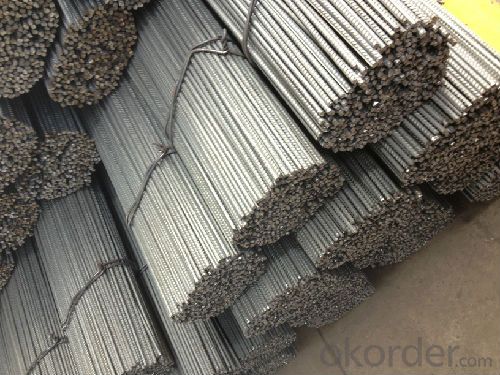
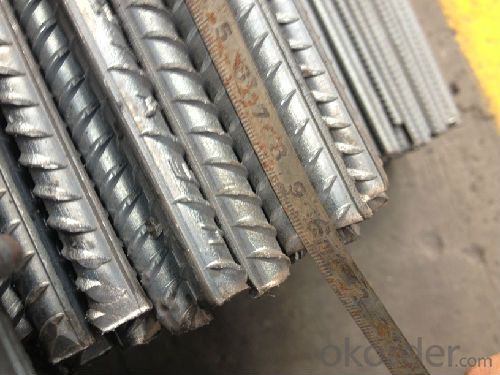
- Q:Can steel rebars be used in reinforced masonry?
- Yes, steel rebars can be used in reinforced masonry. Reinforced masonry refers to the use of steel reinforcement within masonry walls, columns, or other structural elements to increase their strength and resistance to various forces. Steel rebars are commonly used as reinforcement in reinforced masonry due to their high tensile strength and ability to withstand bending and stretching forces. The rebars are typically embedded within the masonry units or mortar, creating a composite structure that can resist compressive, tensile, and shear forces more effectively. The use of steel rebars in reinforced masonry enhances the structural integrity, durability, and overall performance of the masonry construction, making it a widely accepted and practiced technique in the industry.
- Q:Are steel rebars susceptible to stress corrosion cracking?
- Yes, steel rebars are susceptible to stress corrosion cracking, particularly in environments with high chloride content such as coastal regions or areas with deicing salts. The combination of tensile stress, corrosion, and the presence of certain corrosive agents can lead to the formation and propagation of cracks, compromising the structural integrity of the rebars.
- Q:What is the process of testing the quality of steel rebars?
- To ensure compliance with industry standards and specifications, the quality of steel rebars undergoes a series of steps in the testing process. Firstly, visual inspection is conducted to identify any visible defects, such as cracks, irregularities, or improper dimensions. Next, a sample of the rebars is taken for chemical composition analysis. This analysis determines the composition of the steel, including carbon, manganese, sulfur, phosphorus, and other elements, ensuring it meets the required standards for strength and durability. To measure the maximum stress the rebars can endure without deformation or failure, a tensile strength test is performed. This involves applying an increasing load to a sample until it breaks, with the tensile strength calculated by dividing the breaking load by the sample's cross-sectional area. The bend test evaluates the rebar's ductility by bending a sample to a specified angle without any cracks or fractures occurring. This test assesses the rebars' ability to withstand bending and shaping during construction. For rebars intended for use in welded structures, a weldability test is conducted to ensure there are no issues, such as cracking or loss of strength, during the welding process. The rebars are also inspected for dimensional and weight compliance, including length, diameter, and weight. Any deviations from the required specifications may indicate potential quality issues. To assess the rebars' resistance to corrosion over time, a corrosion resistance test is carried out. This involves subjecting the rebars to a corrosive environment or using accelerated corrosion testing methods. Non-destructive testing techniques, such as ultrasonic testing, magnetic particle inspection, or radiographic testing, may be employed to detect any internal defects or irregularities that are not visible to the naked eye. These tests ensure the integrity and quality of the rebars. Once all the tests are completed and the rebars meet the required standards, they are certified and documented. This documentation serves as evidence of the rebars' quality and compliance, ensuring safety and durability in construction projects. By following these comprehensive testing procedures, builders, engineers, and end-users can be assured that the steel rebars meet the necessary quality standards for their intended applications.
- Q:What is the best way to store steel rebars on site?
- The best way to store steel rebars on site is by placing them horizontally on a flat and stable surface, ideally on a rack or pallet, to prevent any bending or warping. It is important to keep them off the ground to avoid contact with moisture and potential corrosion. Additionally, rebars should be organized and grouped by size and type for easy identification and access when needed.
- Q:How are steel rebars used in the construction of chemical processing plants?
- Steel rebars are commonly used in the construction of chemical processing plants to provide structural reinforcement and increase the overall strength and durability of the structures. These rebars, also known as reinforcing bars, are typically made of carbon steel and are used to reinforce concrete structures such as foundations, walls, columns, and beams. Chemical processing plants often involve the handling of hazardous and corrosive substances, which can put significant stress on the infrastructure. Steel rebars are crucial in ensuring the integrity of the structures and preventing potential collapse or failure. In the construction of chemical processing plants, steel rebars are usually embedded within the concrete to form a reinforced concrete structure. This combination of concrete and steel rebars creates a composite material that has enhanced tensile strength, allowing it to withstand the heavy loads, vibrations, and extreme temperature fluctuations commonly found in chemical plants. Additionally, the use of steel rebars helps prevent cracks and structural deformations caused by shrinkage, settling, or external forces. This is important in chemical processing plants where maintaining a secure and stable environment is crucial for the safety of employees and the integrity of the plant's operations. Moreover, steel rebars offer excellent resistance to corrosion, which is vital in chemical processing plants where exposure to corrosive chemicals and high humidity levels is common. By providing a protective barrier to the underlying concrete, steel rebars help prevent corrosion-induced deterioration, extending the lifespan of the structures and reducing maintenance costs. Overall, steel rebars play a critical role in the construction of chemical processing plants by ensuring the structural stability, durability, and resistance to corrosion necessary for the safe and efficient operation of these facilities.
- Q:Can steel rebars be used in corrosive chemical environments?
- No, steel rebars should not be used in corrosive chemical environments as they are susceptible to corrosion which can compromise their structural integrity.
- Q:Are there any limitations on the diameter of steel rebars?
- Yes, there are limitations on the diameter of steel rebars. The diameter of steel rebars is typically standardized and regulated by national and international building codes and standards. These codes and standards ensure that the rebars used in construction projects are of appropriate size and strength to meet safety requirements. The specific limitations on the diameter of steel rebars may vary depending on the intended use and the specific regulations in place. However, it is common to find rebars with diameters ranging from 6mm to 50mm in construction projects.
- Q:Is the tie bar used for the longitudinal joint of cement concrete pavement threaded or smooth? Where is the dowel bar for the transverse joint construction?
- Please note that the recommended answer is really! Do not know the professional knowledge, do not find a copy and paste to harm people! The tie bar is a screw bar, and the tie bar is a device for balance. The steel bar can be used to connect with the concrete! The dowel bar, as the name suggests, is the transfer of force, must use light round steel bar, when powerful, light round steel and concrete have movable interface, can conduction force!
- Q:Can steel rebars be used in swimming pool renovation work?
- Yes, steel rebars can be used in swimming pool renovation work. Steel rebars are commonly used in construction projects, including swimming pool renovations, to reinforce concrete structures and provide added strength and durability.
- Q:What is the process of inspecting steel rebars on-site?
- The quality and adherence to specifications of steel rebars on-site are ensured through a series of steps in the inspection process. Firstly, a visual inspection is conducted to identify any visible defects or damage, such as rust, cracks, bends, or improper dimensions. Immediate attention is given to any issues found. Next, accurate measurements are taken using tools like calipers or measuring tapes. The length, diameter, and shape of each rebar are compared against the project specifications to ensure they meet the required dimensions. For certain projects, chemical analysis of the steel rebars may be necessary to confirm their composition and strength. Samples are taken from different batches and sent to a lab for testing, with the results determining compliance with standards. Non-Destructive Testing (NDT) techniques are utilized to evaluate the internal integrity of the rebars without causing damage. Ultrasonic testing, magnetic particle inspection, and radiography are employed to detect hidden defects like cracks, voids, or inclusions. If welding is involved, the inspector checks the welds for proper penetration, alignment, and quality. This guarantees the strength and integrity of the joint. Throughout the inspection process, detailed records are maintained. These records include information about the inspections conducted, measurements taken, test results, and identified defects. They serve as evidence of compliance and can be referred to in case of disputes or future reference. Once the inspection is complete, a detailed report is prepared summarizing the findings. This report is shared with the project management team, engineers, and other relevant stakeholders. It highlights any non-compliance, defects, or areas that require attention. In conclusion, the on-site inspection of steel rebars is a comprehensive and systematic approach that ensures their quality, integrity, and compliance with project specifications and industry standards.
1. Manufacturer Overview |
|
|---|---|
| Location | |
| Year Established | |
| Annual Output Value | |
| Main Markets | |
| Company Certifications | |
2. Manufacturer Certificates |
|
|---|---|
| a) Certification Name | |
| Range | |
| Reference | |
| Validity Period | |
3. Manufacturer Capability |
|
|---|---|
| a)Trade Capacity | |
| Nearest Port | |
| Export Percentage | |
| No.of Employees in Trade Department | |
| Language Spoken: | |
| b)Factory Information | |
| Factory Size: | |
| No. of Production Lines | |
| Contract Manufacturing | |
| Product Price Range | |
Send your message to us
Stainless Hot Rolled Steel Rebar with Standard GB,UK,USA
- Loading Port:
- China Main Port
- Payment Terms:
- TT or LC
- Min Order Qty:
- -
- Supply Capability:
- -
OKorder Service Pledge
OKorder Financial Service
Similar products
New products
Hot products
Hot Searches
Related keywords
